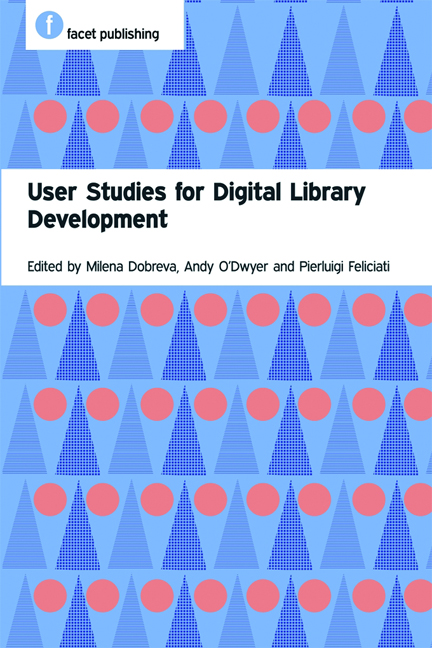Book contents
- Frontmatter
- Contents
- Preface
- Acknowledgements
- Abbreviations
- Glossary
- 1 Introduction: user studies for digital library development
- PART 1 SETTING THE SCENE
- PART 2 METHODS EXPLAINED AND ILLUSTRATED
- PART 3 USER STUDIES IN THE DIGITAL LIBRARY UNIVERSE: WHAT ELSE NEEDS TO BE CONSIDERED?
- 11 User-related issues in multilingual access to multimedia collections
- 12 Children and digital libraries
- 13 User engagement and social media
- 14 Significant others: user studies and digital preservation
- 15 The shift to mobile devices
- 16 Resource discovery for research and course design
- 17 Support for users within an educational or e-learning context
- PART 4 USER STUDIES ACROSS THE CULTURAL HERITAGE SECTOR
- PART 5 PUTTING IT ALL TOGETHER
- Index
16 - Resource discovery for research and course design
from PART 3 - USER STUDIES IN THE DIGITAL LIBRARY UNIVERSE: WHAT ELSE NEEDS TO BE CONSIDERED?
Published online by Cambridge University Press: 08 June 2018
- Frontmatter
- Contents
- Preface
- Acknowledgements
- Abbreviations
- Glossary
- 1 Introduction: user studies for digital library development
- PART 1 SETTING THE SCENE
- PART 2 METHODS EXPLAINED AND ILLUSTRATED
- PART 3 USER STUDIES IN THE DIGITAL LIBRARY UNIVERSE: WHAT ELSE NEEDS TO BE CONSIDERED?
- 11 User-related issues in multilingual access to multimedia collections
- 12 Children and digital libraries
- 13 User engagement and social media
- 14 Significant others: user studies and digital preservation
- 15 The shift to mobile devices
- 16 Resource discovery for research and course design
- 17 Support for users within an educational or e-learning context
- PART 4 USER STUDIES ACROSS THE CULTURAL HERITAGE SECTOR
- PART 5 PUTTING IT ALL TOGETHER
- Index
Summary
Introduction
The international movement to build digital libraries (DLs) using millions of outofcopyright library titles has gained significant momentum in recent years, and Google's mass digitization of several highly regarded research libraries’ collections continues to grab the headlines in commercial newspapers. These commercial projects, which cover the collections of such prestigious libraries as Stanford or Oxford universities, have made available masses of highquality facsimiles of source documents, making a significant contribution to the technologically driven democratization of knowledge. The cultural heritage libraries have an immense potential also for scholarly users in the humanities: they allow access to rare texts or archival material, and biographers, scholarly editors and scholars of premodern texts have been the main beneficiaries of the rapid increase in the volume of digital content.
Whilst scholars in established disciplines have used these sources in research, the question of using the material in course design for new, innovative, interdisciplinary and area studies courses at universities is significantly more complicated. Area studies often involve the study of literary or cultural texts that have not been recently reprinted: the primary and secondary sources are either ‘old,’ or not ‘indigenous’ to the country where the university is. The material is often held in special collections, interlibrary loans are often unsuitable and good practical editions for teaching purposes rarely exist. Therefore, mass digitization is a useful tool for bridging the geographical or spatial gap for historical diaspora studies, translation history and comparative literary studies, and studies in travel writing. The practical aspects of DLs – and the 24/7 access to these materials that they offer for an unlimited number of simultaneous users – places teaching in a new environment (see Chapter 17).
What are the specific difficulties when designing a course in area studies, based on the digitized content of mass digitizing projects and of individual national libraries? And does the existence of such mass projects make the existence of smaller, more focused collections redundant? These questions were raised during the research into digital material for a scholarly portal providing access to East European travel writing, East Looks West. It is a major research project concerning East European travel writing and has been conducted in the School of Slavonic and East European Studies at UCL, London, under the directorship of Professor Wendy Bracewell since 2001 (see www.ssees.ucl.ac.uk/eastwest.htm).
- Type
- Chapter
- Information
- User Studies for Digital Library Development , pp. 167 - 178Publisher: FacetPrint publication year: 2012



